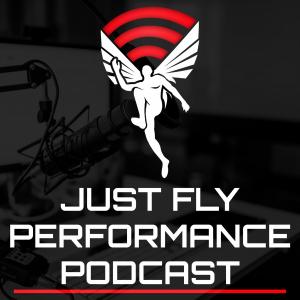Just Fly Performance Podcast

Andrew Cormier and Joel Reinhardt on Reducing Noise and Building a Speed-Based Training Culture in Team Sport Preparation
Today’s show brings on coaches Andrew Cormier and Joel Reinhardt. Andrew Cormier is a sports performance coach at the University of Massachusetts, working with the men’s lacrosse, women’s soccer, and softball programs. Joel Reinhardt is the Assistant Director of Sports Performance at the University of Massachusetts, working with football and women’s lacrosse. Together, Andrew and Joel run the sprint-jump-throw.com website, as well as the Sprint Jump Throw Performance Podcast. Speed training, on the surface is a very simple venture. High quality sprinting efforts in a fresh state is key to getting faster. For track and field this is quite simple, but for team sports, this becomes more difficult, since it’s harder to control fatigue, as well as address the many facets of speed displayed in the course of a game, compared to a simple linear sprint race. Andrew and Joel are two young coaches with a view on speed training for sport that blends “Feed the Cats” ideologies, into their progressive system that seeks to eliminate the noise from an athlete’s regimen. On the show today, Andrew and Joel talk about a speed-based model that they utilize in their team sport preparation, running technique and options in the course of game play, and their model of cueing and instructing athletes. Andrew and Joel have taken on an approach to “rank-record-publish” in speed-based training that gives athletes unique motivation in regards to improving this critical component of athleticism. Throughout the podcast, we also chat about the role of visual field, perception and body language in the development of game speed, as well as diversity in running “options” that high level athletes display. We finish this chat with Andrew and Joel’s take on the utilization of tempo in resistance training, and how much we really need to rely on the weight room for power if speed-based ranking systems are being utilized outside of it. Today’s episode is brought to you by SimpliFaster and Lost Empire Herbs. For 15% off your Lost Empire Herbs order, head to www.lostempireherbs.com/justfly View more podcast episodes at the podcast homepage. Timestamps and Main Points 6:05 Andrew and Joel’s history in working together as coaches and how their podcast came together 11:05 How Andrew and Joel are building a “feed the cats” model of speed development in the context of team sports 18:35 How to replace linear-extensive tempo and long runs with more coordination driven, locomotion-complex style running for field sport athletes 27:50 What KPI’s Andrew and Joel are looking to boost throughout the year in regards to team sport physical needs, and how maximal sprints are ranked-recorded-published 39:35 How to work with athletes who are regularly in the last places in speed-based measurements 42:20 How Andrew and Joel consider change of direction ability in their training regime 57:55 Approaching running technique in light of the needs of team sports and the various types of running that may be present in team sports 1:09.20 Ideas on approaching bar tempo in a weightroom setting “It’s prioritizing the high speed components of the game, and then filling in the cracks elsewhere” Reinhardt “If we are trying to build some sort of physical stimulus, we always go back to “how can we build this playing lacrosse” Reinhardt “Instead of (traditional tempo or a long boring run for soccer players) now we are throwing a bunch of different movements at them (such as gallops)” Cormier “In season we only supplement fly 10’s (for field sport athletes)” Reinhardt We track (fly 10’s) as soon as we are done tracking it, I rank them, send it in the group message, put it top to bottom, color code it, green to red, mark PR’s on there, and they get all excited about it… the slight shift in language even within the team, instead of girls asking “how can I get in better shape” they ask, “how can I get faster” Reinhardt






 Visit Podcast Website
Visit Podcast Website RSS Podcast Feed
RSS Podcast Feed Subscribe
Subscribe
 Add to MyCast
Add to MyCast